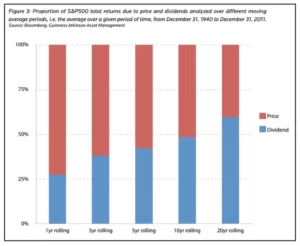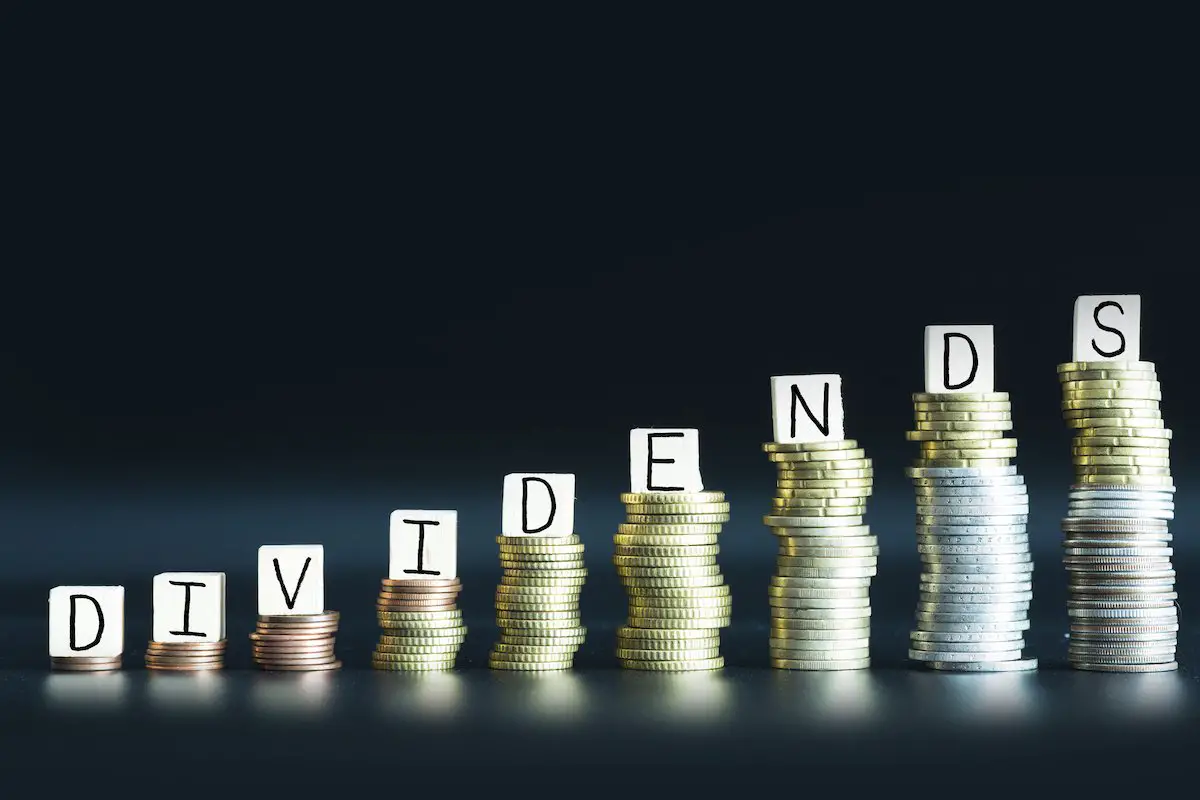Dividends are one of the best ways to build passive income from your investment portfolio, and this is one of the reasons investors prefer to invest in them. If dividends are such a great way to build wealth, why do investors invest in stocks without dividends?
In this guide we will go over the main reasons why investing in non-dividend stocks might not be a bad idea.
What is the point of a stock that does not pay dividends?
To understand why non-dividend stocks exist we have to realize that not every company is the same. Dividends are nothing more than one of the ways companies choose to distribute their profits.
However, profit distribution is not always the best approach. Growing companies are better off investing retained earnings back into the business to fuel more growth. This allows them to create more value for shareholders, than distributing their profits.
Retained earnings can also be a crucial part of remaining competitive. More often than not companies try to increase dividends to keep shareholders happy, while the business deteriorates and loses market share to competitors.
It is crucial that a company avoid neglecting to invest in its own business for the sake of paying dividends to shareholders.
Lastly, dividends are one of the most tax-inefficient ways of investing. This is because you have no say as to when you will receive the dividend and you will be forced to pay taxes on it.
Conversely, buybacks are a lot more tax efficient and they produce similar results. Buybacks also boost the stock price, and you can choose to sell whenever you see fit. This allows you to make more tax-efficient decisions with your portfolio without being forced to pay tax every year.
It does not matter whether you own 100 shares of a company paying a 2% dividend or a 100 shares of a company that goes up 2% more than the latter, and does not pay a dividend.
Why do some companies pay dividends and others don’t?
There are some key factors that determine why some companies pay dividends and others don’t. Here are some of the most important ones:
- Age of the company
- Competitiveness in the industry
- Share price
- Create a shareholder friendly environment
- Show shareholders that the company is creating shareholder value
- Attracts new shareholders
Age of the company
Some companies are relatively young and are still growing, while others are mature businesses with over 100 years of history.
A growing company requires capital to invest and continue to expand, while a well-established company might not have so many opportunities to deploy capital.
Additionally, you also need to consider the size of the business. Small companies are looking to grow, and mature companies are trying to remain stable.
Competitiveness in the industry
Some industries, like tech, have an extremely competitive landscape. This forces companies to continuously reinvest in the business by creating new products and services and trying to maintain their market share.
Share price
Paying dividends also helps companies to increase the share price and to make it less volatile. This can be very attractive, especially for older investors that want to mitigate risk and volatility.
Create a shareholder friendly environment
Paying dividends also shows that the company is friendly with shareholders. This is particularly true in Japan, where Japanese public companies are known to send gifts to their shareholders.
Show shareholders that the company is creating shareholder value
Additionally, dividends show shareholders that the company wants to create shareholder value and reward them over time.
Attracts new shareholders
Finally, a dividend-paying company will also be able to attract investors who are looking for safety and stability. Especially long-term dividend growing stocks, tend to achieve higher valuations.
Why do companies pay dividends?
Dividends are nothing more than retained earnings from the business that the company chooses to distribute among its shareholders. Companies can either distribute earnings in the form of dividends or buybacks or they can choose to use the capital to invest back into their business.
While companies in a growth phase tend to be smaller and have a lower market cap, large companies tend to be bigger. This affects how companies are able to deploy capital.
Why do people invest in stocks without dividends?
Investors invest in stocks without dividends because they are looking for capital appreciation. Additionally, as an investor, you should not rule out stocks just because they do not pay dividends.
It seems foolish to fundamentally analyze a company and determine it is not worthy of investment just because it chooses a specific way to distribute profits.
How do you make money on a stock that does not pay dividends?
There are two main ways of making money on a stock:
- Buybacks
- Price appreciation
Buybacks
Buybacks are one of the best ways that companies can benefit shareholders. They are more tax efficient than dividends, and although you do not receive any income, the value of your shares increases. In turn, the earnings per share also increase.
Buybacks also allow companies to take advantage of lower stock prices, which is also beneficial to shareholders.
Price appreciation
Price appreciation happens when a stock increases in price. It can either happen organically, or the company can reinvest in itself. If a company is able to achieve a higher return on their investment than you can on your investment portfolio, then the retained earnings of the business are better off with them than with you.
Why do investors want dividends?
Most dividend investors look for dividend stocks because they tend to be less volatile, and they also give them a passive income stream.
Dividend stocks are less volatile because part of the return of the stock is accounted for with the dividend. If a dividend stock starts declining in price, the dividend yield will increase making the stock more attractive.
This is why dividend aristocrats, or stocks that have been paying growing dividends for over 25 years, are also considered defensive stocks. The passive income generated by dividends is very attractive for older individuals close to retirement or even retired. They offer a stable and predictable income stream through the dividends, with the potential to increase in price.
Why dividends matter
Dividends definitely matter, and in fact, over the long term dividends have remained one of the most important components of stock returns. It might not be the case in the short term, where price fluctuations can impact returns, but over the course of 20 years, more than 50% of the stock market returns are generated through dividends.

Why does this happen?
One of the reasons is that these dividend companies, which are traditionally dividend growth companies are very high-quality businesses. This is why over time they tend to represent most of the returns in the market. Therefore it is only natural that the dividend paid by these companies represents such a large percentage of the total returns.
Disadvantages of not paying dividends
Some of the main disadvantages of stocks that do not pay dividends are:
- Higher volatility
- Higher risk
- No passive income
Higher volatility
Stocks that do not pay dividends tend to be more volatile because their returns are more unpredictable. A stock that pays a dividend is guaranteeing investors a certain amount of money yearly.
Higher risk
Without paying a dividend the returns on stock will be very unpredictable, and this increases the risk of investing. When you need to convert some shares into cash, you will never know how the share price will be at that point in time. This also adds more risk to owning stocks without dividends.
No passive income
Lastly, stocks that do not pay dividends will not generate any passive income for investors. However, you can always sell some shares when you need liquidity.
Advantages of non-dividend stocks
Here are some of the main advantages of stocks not paying dividends:
- It is more tax-efficient
- Compounding faster without having to pay taxes
- Companies can reinvest in the business
- Companies tend to achieve better ROIC than retail investors
It is more tax-efficient
Since you will be forced to pay taxes whenever you receive a dividend it is by far the worst thing possible in terms of tax efficient investments. Since those taxes are preventing you from being able to compound your money over time, and only paying taxes when you sell the stock and decide to cash out.
Additionally, when you sell a stock you can plan your tax expenses, and with a dividend, you are forced to pay that tax every year.
Compounding faster without having to pay taxes
If you do not have to pay taxes every year, and you allow that money to compound every year, either by the company reinvesting in the business or through buybacks, you will create a lot more wealth.
Companies can reinvest in the business
The management and the board of a company have a duty toward shareholders, and their goal should be to create shareholder value. However, this cannot be done if the business deteriorates. Companies need to constantly reinvest in their businesses to remain competitive and to guarantee that value is being created for shareholders.
Companies tend to achieve better ROIC than retail investors
Lastly, most companies are able to invest back in the business and generate a higher return on capital, than most retail investors on their investment portfolio. For that reason, and to allow your money to compound at a better rate, you might want the company to invest those retained earnings.
When should you buy stocks that don’t pay dividends
If your investment horizon is long, and if you are young and you will not need to use the cash soon, non-paying dividend stocks might actually be a better investment than dividend stocks.
The bottom line is that it only makes sense to receive dividends if you use the dividend proceeds to invest and generate a higher ROIC than the company paying the dividends.
Dividends are also subject to tax, and holding a stock for the long term allows the company to invest and compound that money without you having to pay tax on the dividend income received.
This is one of the reasons Berkshire Hathaway has not paid a single dividend and instead conducts buybacks that are more tax friendly. This allows the company to use its cash to invest back in the business and generate much higher returns.
So when should you invest in dividends stocks?
If the company you are invested in is able to generate a higher return on capital invested than you are, then it is probably better that they do not pay any dividend and keep reinvesting in the business. However, if you can achieve a better return than what the company’s management is able to generate it is better to receive the dividends and use them yourself.
Conclusion
As we have seen there are many advantages of investing in stocks that do not pay dividends, and you should not base your investment decisions on dividends alone. There are excellent companies that pay dividends, and some that don’t.
Your decision to invest in businesses should be made solely based on their quality and fundamental analysis. You cannot simply make investment decisions based on dividends alone.

